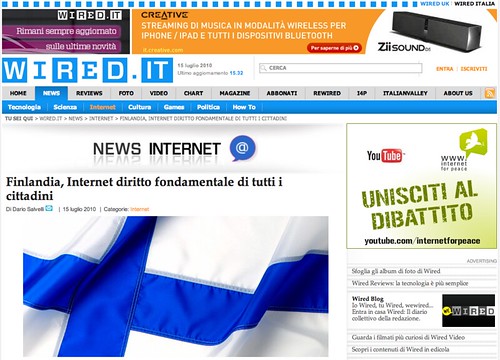
I’ve been interviewed by Dario Salvelli for Wired Magazine about Finland and the recent announcement (1st of July 2010) of the legal right for every Finnish citizen to have access to a 1Mbps (megabit per second) broadband connection.
The article was published on Wired Italia but since it offers some interesting stats and insights I thought to share an English version here on my blog:
Enjoy it and as usual feel free to share your thoughts with comments or via twitter @vascellari! (please remember to link back to this post so it will be easier to track and aggregate the conversation, thanks).
Andrea
Italy, 2010. Families with no PC were reduced by only 2% in the last 8 years, yet new families subscriptions of users that are willing to pay a surcharge on fees just to have a connection to 100 Megabit grew of 40% and about 78% of households with broadband access has at least one child under 18 years old. An incentive to implement the NGN (next-generation high-speed network) in Italy and not wait for the 2015 deadline set by AGCOM to assign broadband services to reduce the digital divide.
In this context, is it possible to imagine a law that includes the Internet as a fundamental right for Italian citizens? Other European countries are heading in this direction. On July 1, Finland became the first nation in the world in which every citizen has the right to access the Internet with a minimum of 1Mbps connection. This law will serve about 4000 Finnish families that still suffer from digital divide and will force providers to install cables out in Finnish rural areas where 5.3 million people live.
The village of Karvia this year will already have a 100MB connection. The plan of the Finnish Government is in fact broader and plans on providing access to 100 Mbps in 99% of the territory available by 2015 by using fiber optic and agreements between mobile operators who already use UMTS900 technology to build and expand the NGN.
“What Finland has achieved is unique not only in terms of technology but especially socially – says Andrea Vascellari, the CEO of itive.net, a digital strategy agency with offices in Finland and New York – This step also represents a turning point for strategy and communications for business, government, education systems and public institutions. In an era where the Internet is no longer an option but a core part of our daily lives we just have to hope that this decision made by a small country in Northern Europe like Finland will inspire others to move in the same direction.”
Anne-Mari Leppinen is Finnish and works for Suupohjan Seutuverkko [disclosure, Suupohjan Seutuverkko is itive‘s client], a company owned by six local municipalities (an area of 3700 km2 for a total of 30 000 persons) which aims at building an open fiber optic network that is already among the fastest in Europe. The purpose of this company is to build the network and use it but not to offer services: all the service providers have the same opportunities to provide services to clients on fiber and users can freely choose who to trust.
The network built in the city and region of Kauhajoki can already replace all the data traffic such as broadband, cable, satellite, digital TV and phone connection. In addition to this in Kauhajoki the fiber is used to improve the efficiency in real estate surveillance, remote control of industrial production and it also enhances the quality of life of the elderly people that live at home.
“At first I thought this law wasn’t a big deal because I thought the minimum speed of market regulation should be more than 1Mbps – writes via email Anne-Mari – This is because here everyone already has a connection with access of 1Mbps or higher, our clients already have some 10 Mbps and some 100Mbps symmetrical connection. When I read that Finland was the first country in the world, I immediately changed my mind. I hope that the next step is to implement an open access fiber optic network because it is the only way to get a qualitative competitive network and reach people who live outside the cities: in fact the problem is that the network operators want to invest (i.e. in fiber) only in the 20 biggest cities in Finland to receive higher revenues from the investment. This is understandable but what about all the other people? In rural areas people have no choice and are blocked by a monopoly that makes the total price and quality of connections far from reasonable. I hope the situation will change after this new law.”
“We were among the first to create an open access fiber optic network and many others are now following our path. The Finnish government has promised that by 2015 all the citizens will be able to access 100Mpbs but can only guarantee that the fiber optic will not be more than 2km away from all homes. This last section to get the fiber at home will be expensive for families (from 500 to 1000 euros) and I think the Government should give grants or support for these miles if you want people to really connect on fiber optic. The other problem is that so far the Government has not specified whether the network will be an open access network: this could potentially re-create monopolies that build closed networks with public money. This year, for example, on about 8 fiber optic projects that have public support ours, Suupohjan Seutuverkko, is the only non-commercial and open access one.”
Finland is not the only European nation that looks at the Internet as a civil right of citizens: In France, the Supreme Court has ruled that Internet access is a right, while Spain and the United Kingdom have similar laws in the pipeline that should be approved respectively in 2011 and 2012.
The Finnish ICT Minister Suvi Linden recently declared to the BBC: “We considered the role of the Internet in Finns’ everyday life. Internet services are no longer just for entertainment“

 Play & Enjoy! [dewplayer:http://ontherecordpodcast.com/pr/otro/electronic/Le_Web_2010_Social_Media_Update.mp3]
Play & Enjoy! [dewplayer:http://ontherecordpodcast.com/pr/otro/electronic/Le_Web_2010_Social_Media_Update.mp3]



